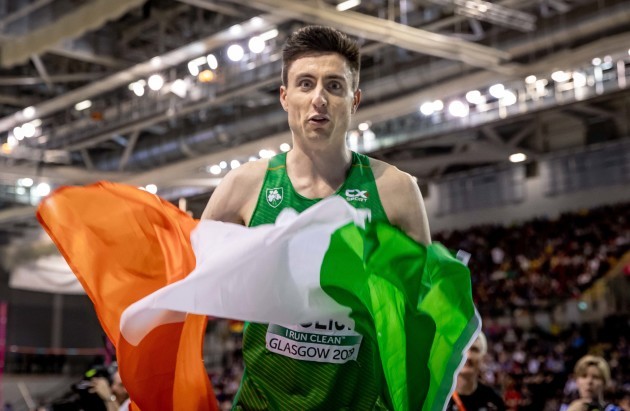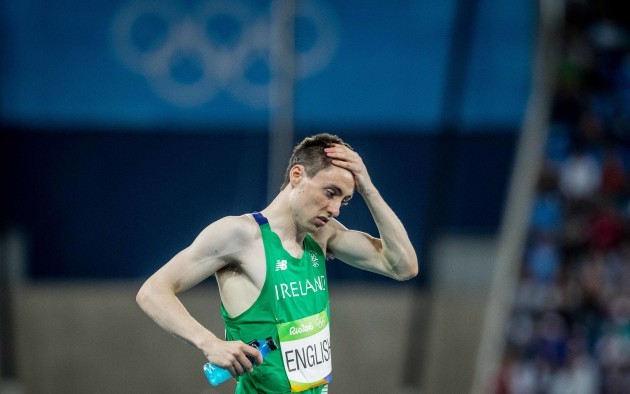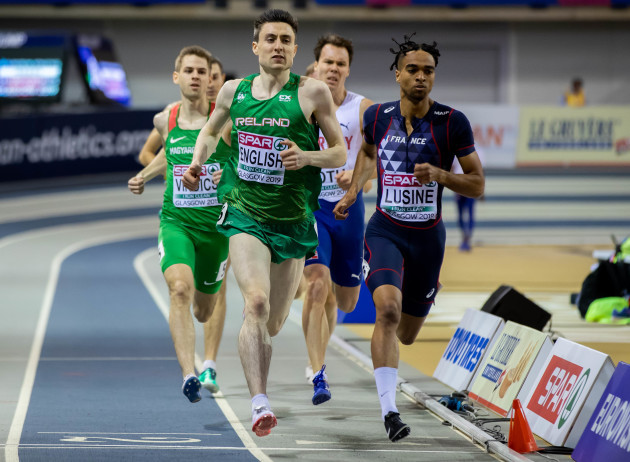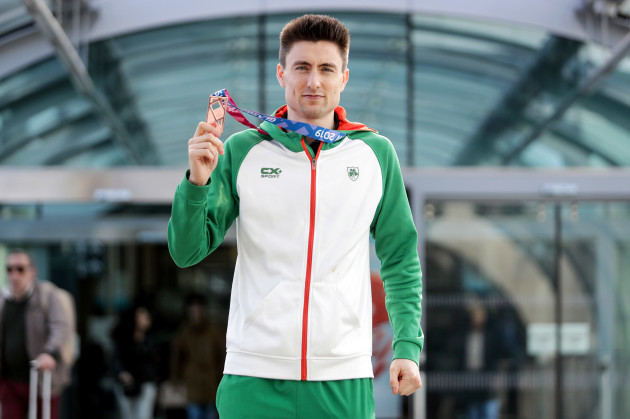OTHERS WOULD HAVE fallen by the wayside.
Others, those less motivated, those without the same level of mental strength and fortitude, would have thrown in the towel.
Others, those without the same single-minded determination, would have bowed and accepted it was all too much.
But not Mark English, the prodigiously gifted talent of Irish athletics. Others, those who commented and criticised, said he lacked the very attributes that have underpinned this second phase of an immensely exciting career.
Hard-work, graft, determination, perseverance, commitment.
It would have been easy for English, at any stage during the last seven years, to quit. Studying Medicine in UCD, three European medals, injuries, two years on placement, armchair critics, setbacks, exams, training and outside noise. It would have broken others.
Despite his achievements, that outside noise was often negative. A part-time athlete, no commitment, no hunger. A 13-time national champion and Olympian, but unfulfilled potential. The forgotten man of Irish athletics, many — those ‘in the know’ — had given up hope. Finished, was the verdict.
But not English. He won a European outdoor bronze over 800 metres as a fresh-faced 21-year-old and then, to further embellish his nascent senior career, claimed European indoor silver the following year. A first Olympics, in Rio in 2016, where he got to a semi-final, followed and the evidence was there for everyone to see. Mark English was heading for the very top.
And all of this while negotiating the first couple of years of Medicine, juggling lectures with training sessions, managing exams around races. There wasn’t a lot of noise at that stage, and if there was, it was all positive. In 2015, he narrowly missed out on a World Championship final, finishing fifth in his semi-final.
The tune quickly changed, though.
His performance in Rio may have left many disappointed, given English’s sharp progress and promising results in the build-up, but preparations had been severely hampered by a broken foot and six weeks in a protective boot, so to get back and fit in time was an achievement in itself.
From an upward trajectory, came the plateau. Another injury, this time a debilitating back issue, caused English two years of problems, while there were a number of badly-timed illnesses that compromised the limited training time he did have.
Major championships came and went and the sight of English exiting stage left without making his mark became a familiar occurrence. Disappointment began to follow him around. And so too did the critics. He hadn’t kicked on, got complacent, didn’t work hard enough, his potential had expired.
“There’s not much time to feel sorry for yourself,” English tells The42. “It can be tough at times when you’re watching coverage of a championships and you hear people talking about the next up-and-coming youngsters and that’s great, it’s fantastic to see so many great athletes coming through, but you know your time isn’t done yet.”
What those on the outside don’t see is what’s going on behind the scenes. The hours of placement in hospitals, the physical and mental exhaustion of combining the two, the frustration of trying to be a world-class athlete on a part-time, largely amateur, footing.
And then there was the chronic nerve problem that severely impeded his ability to run and train and sent a shooting pain down his left leg any time he tried to do so. A bulging disc compressed on the nerve is as complex an injury as it sounds, and it took quite some time to get to the bottom of.
“Yeah, that held me back,” English says. “And then I had to make biomechanical changes to my running form after that, but we eventually got there. Two years it lasted. With a bulging disc, it can be tough to get back from that. Part of me was feeling I may not get back to where I was at before.”
As if the strain of injury and the loss of form and fitness wasn’t enough, English’s studies were becoming increasingly intense and demanding as he progressed through Medicine at UCD.
“It was challenging, especially last year in 2018, it was quite a tough year. Between the injury and everything in college. It’s not so much that you don’t have the time to do both, to study and train, but you just don’t have the energy to do both in the same day, or same week.
But I had to get on with it at some point, I had to get that year done at some point. You can quit, but I’m not a quitter. You just get on with it. You learn to find some sort of balance and in the early years it was good because I found running a good release, a good distraction, from the books. But, obviously, that became a lot tougher.
In 2018, English failed to get out of his heat at the European Championships but he had started to make positive strides again. Through a rigorous analysis process in Manchester, the Letterkenny native’s running mechanics were adjusted and, with the back injury finally leaving him alone, things started to click again.
At the Athlone International Grand Prix in February, English was the talk of the track again for all the right reasons. He stormed to victory in a time of 1:46.94 — his fastest indoors in four years — and a week later, won the National Indoor title in Abbotstown.
“I definitely had more motivation coming back,” English admits. “I’m quite a competitive person anyway, I’ve always wanted to get the most out of myself.
“I just wanted to get back on the track and that was my sole motivation, in addition to my degree obviously. They were the two things in my life and I just made them really important to me. Every day like. Working for both. It was just about getting those two things done.”
And that he did. On the first weekend of March, English proved he was back, and how. A brilliant bronze in Glasgow — his third European Championships medal — meant a return to the podium four years after Prague, for the sweetest of moments.
He dug deep during a thrilling final and, never dropping outside the top three, held on to claim third in a time of 1:47.39, further demonstrating that fluctuations of form and fitness are just that, and he has certainly not gone anywhere.
“That was pretty sweet,” English laughs. “The best way to answer your critics is to always run well and I knew that going to Glasgow. I was absolutely delighted to come home with a medal.”
The hard work didn’t stop there. A couple of weeks later, English was knee-deep in his final exams, coming through to graduate from UCD after seven hard, long years of studying Medicine. His graduation ceremony earlier this month must have felt as gratifying as standing on any podium.
With a degree in his back pocket, and a ‘ticket for life’ punched, English is now very much a man with a plan. A decision on what he wants to specialise in is for further down the road, because he is finally in the position to concentrate all his time and energy into athletics for the first time ever.
That means English, having won three European medals as a part-time athlete and medical student, is going full-time in a bid to bring his career to new levels through to Tokyo 2020 and beyond.
Now linked up with manager Derry McVeigh of Silver Hatch Sports, and agent Ray Flynn, English speaks of this next chapter with renewed excitement and vigour, fully aware of his talent and the opportunities now in front of him.
The long-term plan is to move abroad to train in warm-weather conditions with top athletes from around the world, but recently English has been training at home in Letterkenny ahead of a stacked July schedule and the World Championships in late September/early October.
“It is the second stage, for sure. Moving on now to training full-time is going to be a completely different scenario for me. It will offer up new opportunities to improve. It’s really exciting, I’m really looking forward to it. I’m in a good place, I have my degree and going full-time. I’m in a really good head space at the minute.
“My head is much more there [than before]. I know what I need to do now, I know what training works, I know what training doesn’t work. I know which people work for me, and which people don’t work for me. I’m much more aware of what I need to do to get my body to the place where I can run 1:43/1:44.”
The 26-year-old, awarded a ‘world class’ Sport Ireland grant of €16,000 on the 2019-2020 carding scheme at the start of the year, will race in Italy on 9 July, in Barcelona on 19 July and then take in the London Diamond League meet on 21 July.
While he is in an excellent place right now, both physically and mentally, English will only get an accurate gauge of where he’s at when he returns to racing again, having had to pull out of the Oslo Diamond League recently through illness.
With 1:45.00 the golden number for Tokyo 2020 qualification, English very much has his sights on that and a place at his second Games on his mind, while there is also the small matter of the Irish record he has been chasing for a number of years now.
That’s held by David Matthews, who clocked 1:44.82 back in 1995, with English’s personal best — 1:44.84 — recorded when he was just 20, so that carrot is dangling in front of his eyes now that a difficult period is in the rearview mirror.
“I’d like to make my second Olympic Games next year and try and take the Irish record as well,” he says of his immediate aims and aspirations as a full-time athlete. “My gut feeling is that I’ll go abroad to train next year but that won’t be decided until after this season.”
Either way, English is determined to make the most of this next phase.
“Your body does age and you can’t go on forever,” he continues.
I don’t want to be sitting at the bar at 45 wondering what could have been. I just want to give athletics the best go I can and see what my body can give me. It’s really exciting to see what I’ll be capable of doing now that I can give my full attention to athletics.
It seems remarkable to say, particularly when he is a three-time European medalist at just 26 years of age, but you get more than a sense that the very best is yet to come from English.
“I’d like to think it is,” he agrees. “I’ve never devoted myself full-time to athletics. Ever. I think even just mentally knowing that I’m giving my full attention to something, I will want to do everything to make sure my body is ready for it.
“Yeah… the best is to come.”
The42 is on Instagram! Tap the button below on your phone to follow us!




